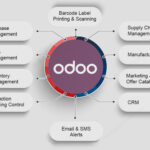What is Robotic Process Automation?
Robotic Process Automation or RPA is the use of software with Artificial Intelligence and machine learning capabilities to handle high volume repetitive tasks that previously required humans to perform.
Some of these tasks include addressing queries, making calculations, maintenance and records and performing transactions.
The RPA includes 4 crucial phases in its working
- 1
The planning phase
The planning phase usually involves gathering the processes to be automated, identifying the test objects and finalizing the implementation approach.
- 2
The development phase
This phase includes the creation of automation work flows according to the agreed plan.
- 3
Deployment and testing phase
Deployment and testing is a vital phase. It ensures a bug free product
- 4
Support and maintenance phase
This guarantees that the product is continuously updated with smooth deployment across the user base.
Things to keep in mind while working with Robotic Process Automation
RPA is not a humanoid Robot
With the name “Robotic Process Automation” it may remind us of robots or some unknown kind. It does not have a physical form and no human resemblance to humans. Robotic Process Automation will not be able to replace humans or replicate human cognitive functions. It doesn’t have a brain of its own and will not perform logical or critical thinking as humans do.
Everything around us is getting more and more automated, but Robotic process automation (RPA) is the utilization of software with artificial intelligence (AI) and machine learning to manage high-volume, repetitive, time-consuming tasks that humans need to perform. It’s a software robot, specifically
Software BOTs can function 24*7 and can reduce 25% of the cost with better Quality.
These software BOTs are like a virtual worker that runs 24/7 with minimal downtime depending on a defined schedule or triggers and also promotes productivity as well as producing greater predictability and higher process quality.
RPA Software enables time to innovate, grow and aim on customer fulfillment
As RPA is responsible for the menial tasks, employees have more time to aim on main human responsibilities like marketing, sales, strategy, and solutions. As a result, this will set up higher business value and develop effective customer engagement. When Robotic Process Automation has been installed in a company, staff roles might require to be reviewed and employees will be relocated to more crucial customer service activities, as the tedious back-office processes are now automated.
RPA Technology is not expensive
Taking the case of the high pricing of business process management software (BPMS) or enterprise resource planning (ERP) setup L, Robotic Process Automation is a much more cost-friendly option. In addition, RPA’s capability to reduce costs and grow enterprise ROI is consequential. PwC states that ‘While a number of solution options exist, RPA technology offers a superior customer experience and dramatic error reduction, providing significant cost and efficiency benefits in short timeframes. Being relatively simple to implement, RPA can deliver benefits quickly and ROIs of between 300 – 800% are common.’
RPA Technology is not expensive
Taking the case of the high pricing of business process management software (BPMS) or enterprise resource planning (ERP) setup L, Robotic Process Automation is a much more cost-friendly option. In addition, RPA’s capability to reduce costs and grow enterprise ROI is consequential. PwC states that ‘While a number of solution options exist, RPA technology offers a superior customer experience and dramatic error reduction, providing significant cost and efficiency benefits in short timeframes. Being relatively simple to implement, RPA can deliver benefits quickly and ROIs of between 300 – 800% are common.’
RPA technology will not replace the human workforce
At the same time it’s true that some activities previously executed by company employees will be automated these days with RPA technology that definitely does not mean that human staff is rejected. Software robots will not be able to function independently without humans and they are still not able to accomplish the more difficult human high thinking processes. So human employees will be assisted by the introduction of Robotic Process Automation technologies to support staff members’ performance instead of displacing or replacing them. There are advantages to be had for both enterprises and employees.
Future of RPA
Since 2016, Robotic Process Automation service adoption has been showing immense growth and will continue to increase beyond. As per McKinsey’s research knowledge and work automation could have an economic impact of 5-7$ trillion by the year 2025. It will affect over 230 million knowledge workers which constitute 9% of the global workforce. Any company which is labor intensive where people are performing high volume, high transaction functions stand to benefit the most with RPA adoption. Boosting their capabilities and saving money and time.






